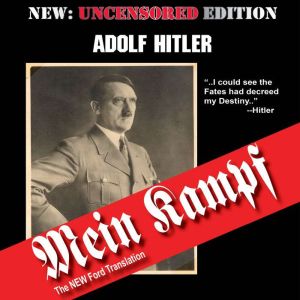Putting the controversy of Hitler aside for a moment, the narrator does a superb job with the content, making the listening a pleasure. This is especially important when the work contains a lot of dry and theoretical material, such as found in Mein Kampf. Michael Ford should be commended as well for translating this work in a way that is much more understandable to a modern, and especially American, audience. I've read older translations of Mein Kampf that were certainly dated and much less clear. Nevertheless, I did compare several passages that I was familiar with to other translations in order to confirm that the meanings were essentially the same, and indeed they were.
As another reviewer mentioned, I too, want to thank AudiobooksNow for allowing this work to be published and presented on their site. Kudos! We live in an age where censorship and book burning seems to be alive and well. Regardless, of whether one agrees with the author or not, censorship should be concerning to everyone. People should be free to judge the material for themselves and not be pre-empted by someone else's personal opinion.
As for the author, Herr Hitler is like many unpopular historical figures. He is remembered by history for his negative qualities with little thought or comment given to his more positive attributes. To quote a line from Shakespear: "The evil that men do lives after them; the good is oft interred with their bones." Such is the case with Hitler and many others. His talents as a gifted artist, writer, thinker, and designer are all forgotten, as well as his remarkable feat of lifting the German people out of poverty when their future was very bleak.
There is always something to learn from other people, especially historical figures. Regardless of how evil or saintly a person is portrayed, it is certain that one will find good among the evil and evil among the good. I prefer to know both sides before making judgements, even if I may not agree with one side or the other.
Herr HItler had interesting things to say on a wide variety of things, many being profound and ominously accurate in my opinion. Such as the admonition against being politically active before the age of 30. When I was younger, I may have disagreed, but now I can see the relevance. When one is younger, he or she does not have a long enough frame of reference to see how political patterns repeat again and again. Such blindness can lead one to support detrimental causes early in life.
In any case, I would certainly recommend Mein Kampf for its historical value and insights, even if one doesn't agree with Hitler or the negative things that he did. Consider that often the most brilliant people go mad towards the end of their lives. Paul Morphy, Bobby Fischer, Henry VIII, and others.


